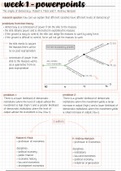Summary
2021 - Empirical Legal Studies: powerpoint summary week 1-5
- Course
- Institution
These notes are powerpoint notes from week 1 until week 5 of the course Empirical Legal Studies, the second course of the minor Law&Economics. The notes are made in goodnotes and include graphs, tables and all of the other important information from the powerpoints. The powerpoints from week 6 and ...
[Show more]



